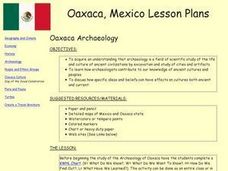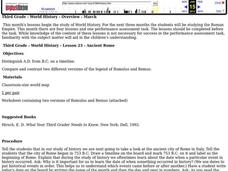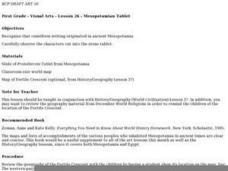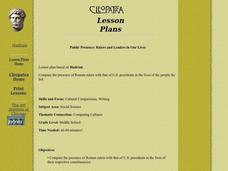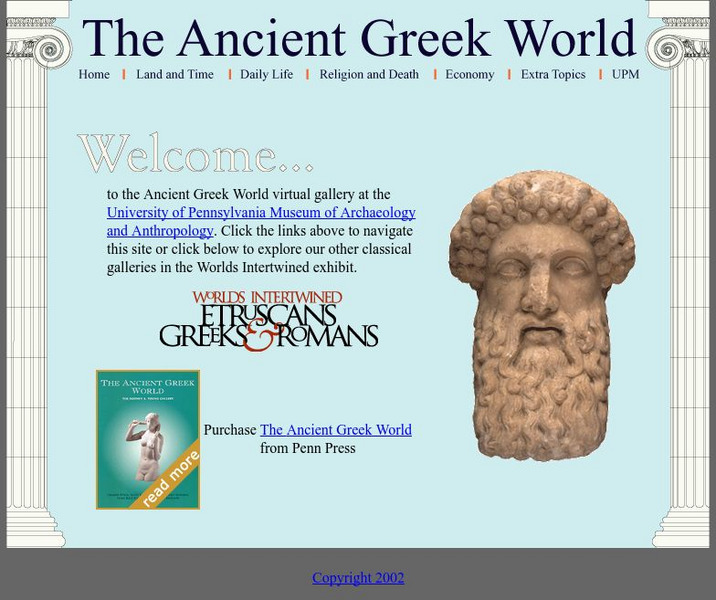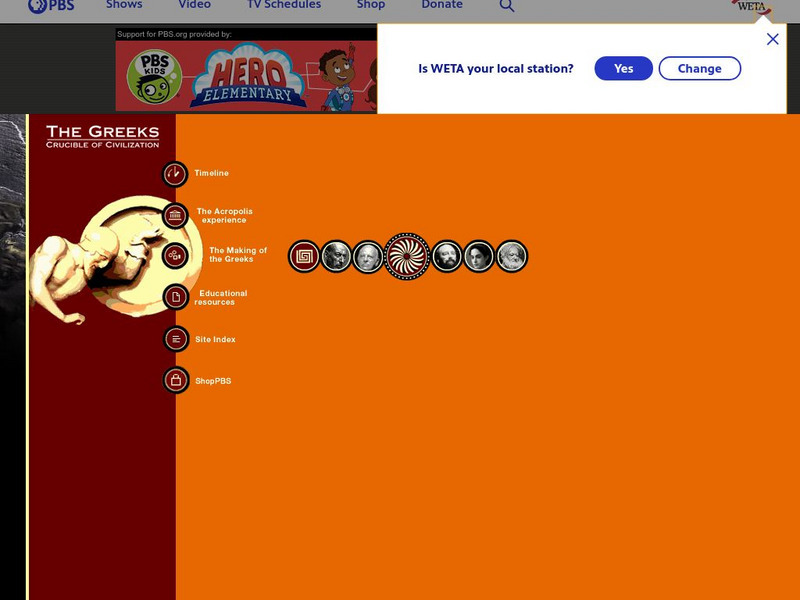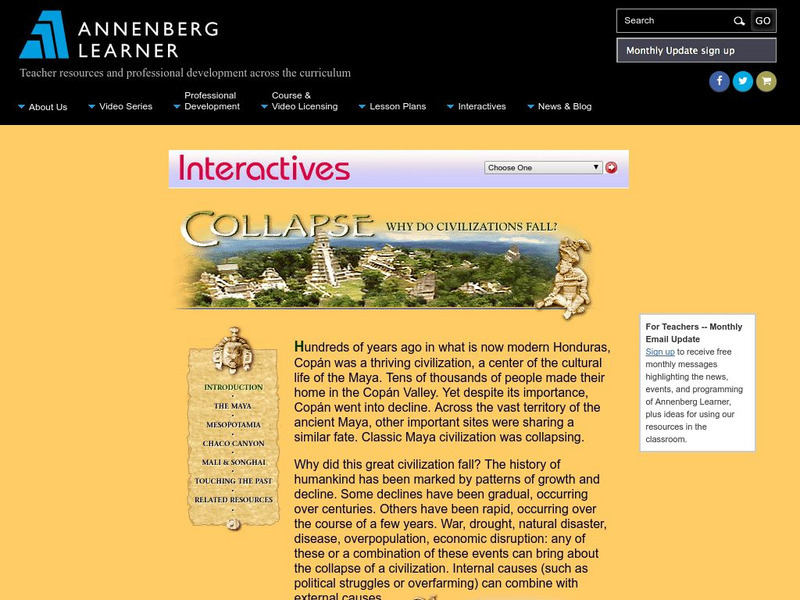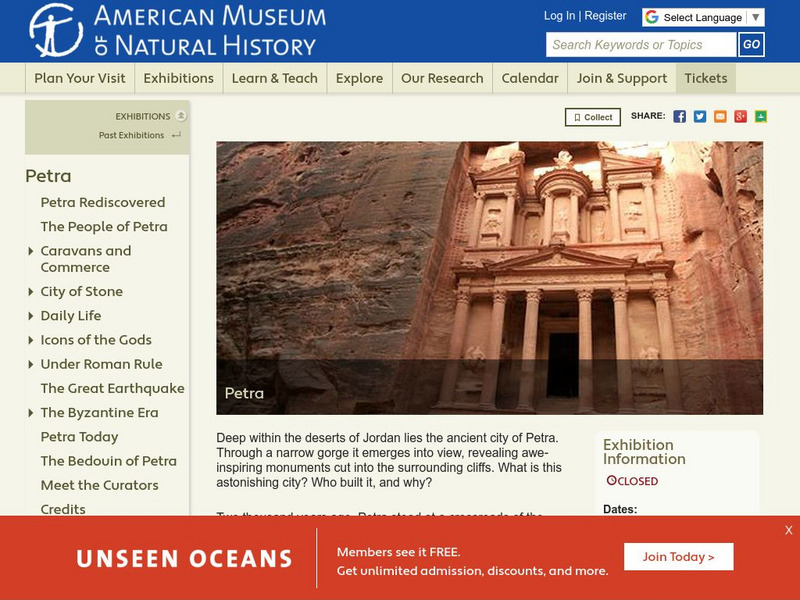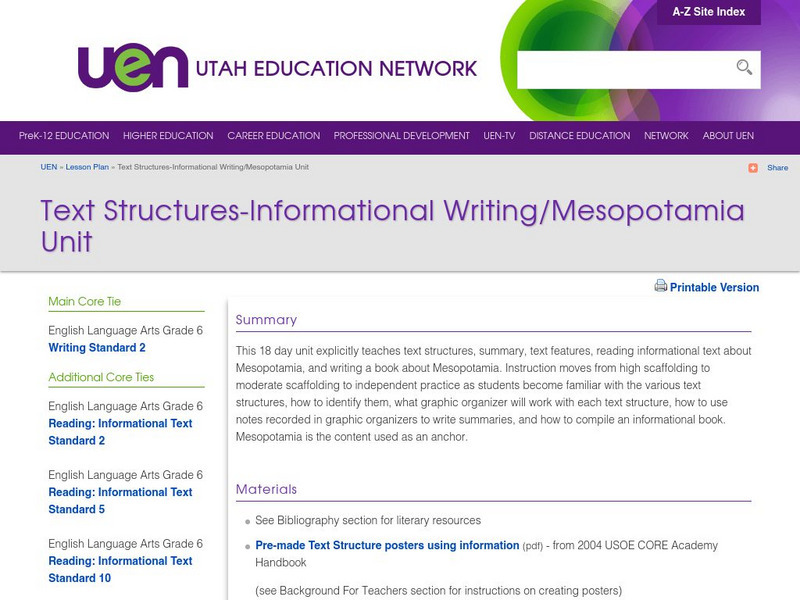Curated OER
Who Built the Pyramids?
Students examine the two theories on how the pyramids at Giza were built. They watch a video on pyramids, take notes, and write a five-paragraph essay on how they think the pyramids were constructed.
Curated OER
Oaxaca Archaeology
Students acquire an understanding that archaeology is a field of scientific study of the life and culture of ancient civilizations by excavation and study of cities and artifacts.
Curated OER
Ancient Rome
Third graders distinguish A.D. from B.C. on a timeline. They compare and contrast two different versions of the legend of Romulus and Remus.
Curated OER
Mesopotamian Tablet, Egyptian Art
First graders examine cuneiform writing from a stone tablet, then write a simple sentence using pictographs. They analyze various examples of Egyptian art, construct a model of an Egyptian boat, and create a class painting using glyphs...
Curated OER
The Three Doctrines & Legalism
Sixth graders imagine themselves to be, in turn, a follower of Buddhism, Taoism, Confucianism, and Legalism. They are given a handout that lists seven questions. Direct students to write down how they feel an individual would answer...
Curated OER
Egyptian Enterprises
Students prepare a cultural exhibit on Egyptian history, culture, sites, monuments, and hieroglyphics using such media as posters, computer presentations, puppet shows, short plays, videotapes, museum exhibit panels, brochures and scale...
Curated OER
Ancient World
Sixth graders play a powerpoint jeopardy game. This can be used as a test or as a way to review information. This is a culminating test for our unit on Ancient Worlds. The jeopardy game is based on goals in math, language arts, and...
Curated OER
Household Decoration
Students compare two ancient artworks to determine how they originally functioned in private Roman homes. They compare and contrast the Fallen Warrior fragment and the Mosaic Floor to determine how each functioned in a private Roman...
Curated OER
Public Presence: Rulers and Leaders in Our Lives
Students compare the presence of Roman rulers with that of U.S. presidents in the lives of the people the led. They complete a worksheet imbedded in this lesson plan.
Curated OER
Burial Practices and Memorials
Young scholars compare and contrast burial practices in ancient Egypt, the former Soviet Union, and the United States.
Kids' Wings
Texas Bluebonnet Books: "Weslandia"
Here you will find websites on plants and ancient civilizations to enhance the book "Weslandia," by Paul Fleischman.
Penn Museum
Penn Museum: Ancient Greek World
Massive site for information on the ancient Greek world. Follow the navigation at the top of the page for detailed sections on time periods, daily life, religion and death, economy, and more. Each section includes pictures of artifacts...
Smart History
Smarthistory: Ancient Near East: Cradle of Civilization
Smarthistory overview of the ancient Near East, deemed the Cradle of Civilization, providing details, maps and illustrations depicting the geography and complex history of the area of what is now modern day Iraq. With links to additional...
PBS
Pbs Nova Online: Be an Archaeologist
Ancient artifacts tell archaeologists a lot about the lives of prehistoric people. Sharpen your archaeological skills by reassembling broken pieces of a clay pot. See before and after photos of ruins, plus a film of a projected...
PBS
Pbs: The Greeks Crucible of Civilization
Contains a great deal of historical information about ancient Greece that supports the PBS program "The Greeks- Crucible of Civilization." Includes a timeline, a virtual tour of the acropolis, lesson plans to accompany the show, and more.
Other
University of North Carolina at Pembroke: Lecture Notes: Ancient Civilizations
Lengthy illustrated notes, to accompany a university-level course, on the first civilizations in the ancient Near East: Sumer and Egypt.
Annenberg Foundation
Annenberg Learner: Collapse: Why Do Civilizations Fail?
Explore different ancient civilizations to learn about some of the reasons these civilizations collapsed. Looks at Maya, Mesopotamia, Chaco Canyon, Mali and Songhai. Includes interactive activities.
Other
Primary Source: Online Curriculum
A collection of three teacher-developed curricular units that use primary resources. Topics include the Ottomans, river pollution in India, and Chinese bronze bells. Additional units are available for a reasonably priced membership.
American Museum of Natural History
American Museum of Natural History: Petra: Lost City of Stone
Explore present-day Petra and its past with this resource. Click on "View Panorama" at the bottom of the screen for a trip all around this incredible ancient city. This beautiful site explores the people of Petra, their daily life, and...
Utah Education Network
Uen: Text Structures Informational Writing/mesopotamia Unit
This module provides an 18-day unit about Mesopotamia. Teachers of the unit will explicitly teach students about text structures, summary writing, reading informational texts, and writing a book about Mesopotamia.
Other
Archaeological Legacy Institute: Archaeology Channel: Video Buffet
This site has a large collection of free videos featuring various archaeology sites all over the world.
Other
Simon Frasier University: A Journey to a New Land
This interactive site examines questions about early human migration to North America offers grade-level appropriate information for primary, elementary, middle, secondary and post-secondary levels. Teacher resources, simulations, video,...
National Endowment for the Humanities
Neh: Edsit Ement: The Aztecs Mighty Warriors of Mexico
Unit plan to teach about the Aztec civilization. Includes websites, worksheets, activities, and extending the lesson.
Annenberg Foundation
Annenberg Learner: Collapse: Why Do Civilizations Fall?
Why did great civilizations fall? War, disease, overpopulation or natural disasters? Interactive content and activities allow you, by sifting through archaeological evidence, to investigate the collapse of the Mayan civilization, the...



